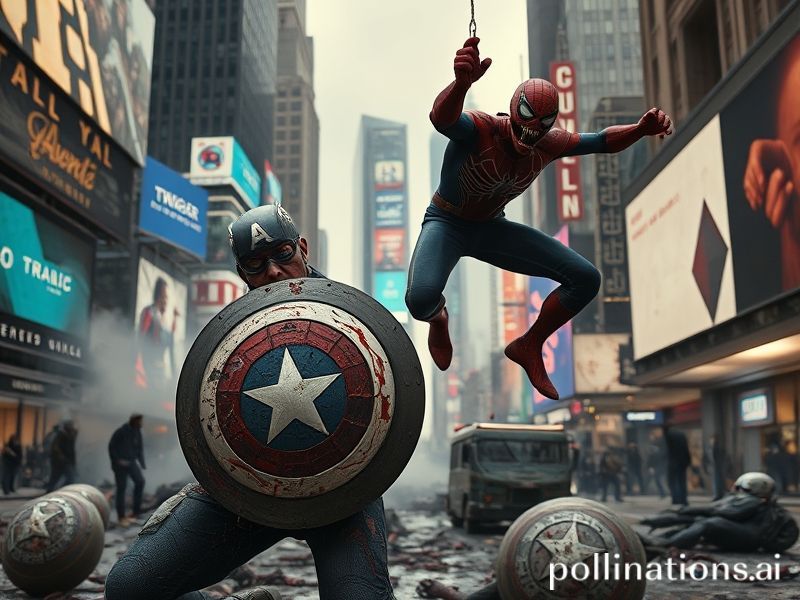Marvel Zombies Season 2: Global Feast of the Undead Avengers and the World That Streams It
Marvel Zombies Season 2: When the World’s Favorite Superheroes Finally Eat Each Other and the Rest of Us Cheer
By the time the first episode of “Marvel Zombies Season 2” dropped—simultaneously in 190 territories at 3 a.m. local time, because Disney has transcended circadian biology—four different governments had already issued travel advisories for fictional nations. Wakanda, Sokovia, Madripoor, and even the made-up Himalayan microstate of Ta-Lo were suddenly “high risk for undead Avengers activity,” according to Canada’s famously overcautious foreign ministry. If that sounds like bureaucratic cosplay, congratulations: the planet has officially reached the stage where even our paperwork is infected by pop culture.
From Lagos to Lahore, Seoul to São Paulo, the second season of Marvel’s animated buffet of caped cannibalism is being streamed on cracked cell-phones, pirated firesticks, and the occasional hyper-secure NATO laptop. UNESCO’s latest report on global screen time politely called the phenomenon “a shared narrative grammar,” which is diplo-speak for “everyone, everywhere, is watching Spider-Man get his arm gnawed off by a zombified Captain America instead of, say, fixing the climate.” The irony is delicious—almost as delicious as the on-screen viscera—because the show’s central gag is that the heroes who once saved the universe are now the universe’s most pressing public-health crisis. If that parallel doesn’t make you laugh in a wheezy, end-is-nigh kind of way, congratulations again: you still have hope.
The real marvel, of course, is the global supply chain that keeps this undead circus on the road. High-end render farms in Weta, Seoul, and Vancouver crunch exabytes of data so that a pixelated Wanda Maximoff can telekinetically disembowel Doctor Strange in 8K HDR. Meanwhile, Filipino animators earning third-world wages hand-paint extra pus for “authentic decay,” a phrase that sounds like it belongs on a craft-beer label but actually ends up in the credits between “Assistant Zombie Choreographer” and “Cultural Sensitivity Consultant.” Somewhere in Mumbai, a 19-year-old compositor is rotoscoping Thor’s intestines while his parents text him to ask why real engineering school was too boring. The world keeps spinning, held together by duct tape, deferred dreams, and Disney+ subscription tiers.
Diplomatically, the show has become an accidental soft-power thermometer. China’s censors trimmed a scene where zombie Shang-Chi uses the Ten Rings as chakrams to bisect an undead Iron Man—apparently “disrespectful to national artifacts.” France’s broadcasting authority flagged the same scene for “excessive American cultural imperialism,” which is the closest Paris ever comes to applauding anything. Meanwhile, the Kremlin’s unofficial Telegram channels are circulating memes that recast the zombie Avengers as NATO, devouring sovereign nations one bite at a time. State propaganda has always been derivative; now it’s also fan-fiction.
Then there’s the merchandise. A factory in Shenzhen is stamping out plastic zombie Captain Marvel lunchboxes that retail for $17.99 in Des Moines and leak microplastics into the Mekong. In Nairobi’s bustling Toi Market, bootleg T-shirts depict a half-eaten Black Panther under the Swahili slogan “Hakuna Matata, Only Matata.” The vendors, who have never seen the show, price them according to how sad the cat looks. Global capitalism, it turns out, is the most honest critic: it puts a dollar value on our apocalypse fantasies and still manages to turn a profit.
Season 2 doubles down on the moral calculus that made Season 1 so bingeable: if superpowers can’t save us, maybe super-cannibalism can at least thin the herd. Episode three features a UN Security Council cameo—voiced, naturally, by the actual French ambassador to the UN, because art demands authenticity—debating whether to nuke the infected Avengers or sell them to Disney+ as premium DLC. The motion fails after Russia vetoes anything that might boost American streaming revenue. Somewhere in Geneva, a junior diplomat updates their LinkedIn: “Policy advisor on trans-dimensional biohazards (Marvel continuity).”
As the credits roll, a mid-credit stinger teases zombie Kang the Conqueror assembling a multiversal army of undead variants, which is either a clever metaphor for the endless franchising of intellectual property or just another Tuesday in the content mines. Either way, the takeaway is elegantly nihilistic: the world’s most powerful heroes are now its most contagious villains, and we can’t stop watching. If that doesn’t sum up the international mood circa 2024, perhaps we need a Season 3—preferably one where the audience finally turns.







